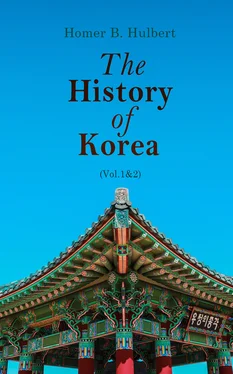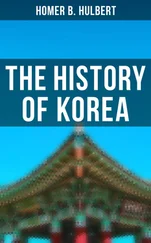The next year after these stirring events, namely 931, Wang-gön made a visit to Sil-la taking with him an escort of only fifty soldiers. The king of Sil-la came out to meet him and they feasted there at the meeting-place together. The king of Sil-la lamented the smallness and weakness of his kingdom and deplored the ravages of Kyŭn-whŭnKyŭn-whŭn. The evils, he said, were beyond estimation; and he broke down and wept. The courtiers did the same and even Wang-gön could scarce restrain his tears. After this they had a friendly talk and the king of Koryŭ remained as a guest for some twenty days. As he left the capital of Sil-la the people vied with each other in doing him honor. Poor old Sil-la had gone out of fashion and the minds of all men were turned Koryŭ-ward.
Wang-gön had a strong predilection for P‘yŭng-yang, the ancient capital of the country. He had already established a school there with professorships of literature, medicine and incantation. He now in 932 conceived the project of moving his capital northward to that place. To this end he erected barracks there for his troops and was making other preparations for the change, when he was dissuaded from it by some evil omens. A great wind blew down some of the houses in P‘yŭng-yang and, so the story goes, a hen became a cock. These portents made it impossible to carry out the plan. It was about this time that he built a guest-house outside the walls of Song-do to be used as a reception hall for envoys and messengers from the wild tribes of the north. Suspicion as to the object of their coming may have made it seem undesirable to allow them to enter the city proper, or it may have been simply to impress them with the importance of the place.
Kyŭn-whŭn’s right hand man came and swore allegience even though, at the time, his two sons and his daughter were hostages in the hands of his former master. When Kyŭn-whŭn heard of it he burned the first son alive and would have treated the second son and the daughter in like manner had they not effected their escape to a retreat where they lay in hiding till his death. This desertion seems to have roused the old man’s ire, and he longed for the din of battle once more. He could still command a considerable force; so he entered upon another campaign and as usual was at first successful. He seized three districts in the east country and set fire to a large number of towns. It was not until the next year that Wang-gön sent an expedition against him. This was under the command of Gen. Yu Gön-p’il, whom the king had banished but had pardoned and recalled because of his lively efforts while in exile to raise a company of soldiers. He never seemed to know when he was beaten. He routed the forces of Kyŭn-whŭn and returned in triumph to Song-do, where he was hailed as the savior of the people. We may judge from this that Kyŭn-whŭn was still considered formidable. In another fight Gen. Yu captured seven of Kyŭn-whŭn’s captains and one of his sons as well.
As things seemed quiet now, the king made a royal progress through the north and west, helping the poor, inspecting fortresses, supplanting unpopular prefects; but when he got back he found his old enemy still active, and at Un-ju he had his last great fight with him. In this struggle three thousand of the enemy were killed and thirty-two fortresses were taken. The year 935 A.D. is another mile-stone in Korean history. It marks the end of a dynasty which lacked but eight years of completing a millennium. But we must relate the events of the year in order. Kyŭn-whŭn had many concubines and more than ten sons. Of the latter the fourth named Keum-gang, was the one he loved the best, a boy of robust body and great intelligence. The old man passed by his other sons and named this one as his successor. This of course made trouble at once. The first son, Sin-geum, led a conspiracy and the old gentleman was seized and imprisoned in Keum-san monastery, the young Keum-gang was put to death and Sin-geum ascended the insecure throne of his father, now doubly insecure, since it had lost the masterly genius which of late years had been its only support. But old Kyŭn-whŭn had not played his last card. After three months imprisonment he succeeded in getting his guards drunk (jolly monks those) and escaped to Ka-ju from which point he had the colossal impudence to send a letter to Wang-gön surrendering and asking for asylum in Koryŭ against his own son. It was granted and soon a ship of war arrived with a high official on board to escort the grey old wolf of the south to the Koryŭ capital, where he was received as a guest, given a comfortable house and plenty of servants and the revenues of Yang-ju prefecture. From that point we may believe that he waited patiently to see the overthrow of his sons.
But these are small events compared with what followed. The king of Sil-la determined to abdicate and hand over the remnant of his kingdom to Wang-gön. When he broached the matter to his officials no man raised his voice. They could not assent and they knew there was no use in demurring. The crown prince urged his father to submit the question to the people and to abide by their decision, but the king was determined and so sent a letter to Song-do offering to lay his scepter at the feet of Wang-gön. The crown prince was in despair, refused to see his father, retired to a mountain retreat and ate coarse food as a token of his grief. He died there of chagrin and sorrow.
Wang-gön answered by sending one of the highest officials to escort the ex-king to Song-do. The royal procession was ten miles long, as it slowly wound its way out of the deserted city amidst the clamorous grief of the people. Wang-gön met him in person at the gate of Song-do. He did not want the ex-king to bow to him but the courtiers had decided that as the country could have but one king this must be done. So the new arrival did obeisance. Wang-gön gave him his daughter to wife and made him prime minister, set aside the revenues of an entire district to his use and conferred high rank upon the Sil-la courtiers.
And so ended the ancient kingdom of Sil-la which had existed for 992 years, from 57 B.C. to 935 A.D. Her line of kings included fifty-six names, which gives an average of about eighteen years to each reign. From that day the capital of Sil-la was called simply by the name Kyöng-ju. We believe that history shows few instances of greater generosity, forbearance, delicacy and tact than are shadowed forth in the life of this same Wang-gön. Does history show a nobler act than that of providing a comfortable home where his old enemy Kyŭn-whŭn might spend his last days in comfort and ease? Does it show more delicacy than was shown by Wang-gön when he took every means to cover the chagrin of the retiring king of Sil-la by treating him as a royal guest?
Table of Contents
Kyŭn-whŭn’s sons defeated. … Buddhist teachers from China. … The Emperor recognizes Koryŭ. … Wang-gön refuses to treat with the Kitans … makes ten rules … king marries his sister … plot detected … practical Shogunate. … Buddhism flourishes. … P‘yŭng-yang. … Chinamen take office in Koryŭ … slavery … examinations. … Chinese favored … official garments … incapable king … retrogression … reform. … Confucianism. … Kitan growing … bureau of history reorganized … equilibrium between Confucianism and Buddhism. … Uk is banished … quarrel with Kitan … concession … dispute. … China refuses aid … the provinces … the “Emperor” of Kitan gives the king investiture … first coinage … reforms … conspiracy crushed.
Before leaving the kingdom of Sil-la to be swallowed up in antiquity we must notice a few corollaries. We will notice that Sil-la was the first power to gain the control of the whole peninsula. It was the language of Sil-la that became at least the official language of the entire country. The yi-t‘u , or system of diacritical marks, tended to stereotype the agglutinative endings, so that we find to-day the general characteristics running through the grammar of Korean are those which characterized the language of ancient Sil-la. This fact, clearly grasped, goes a long way toward opening a way for the solution of the question of the origin of the language.
Читать дальше












